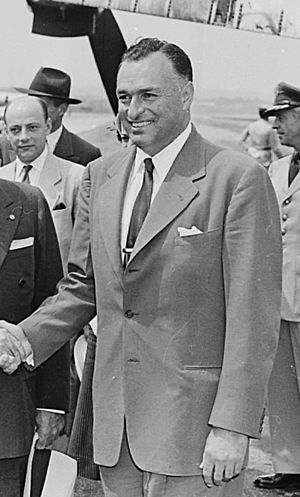Galo Plaza facts for kids
Quick facts for kids
Galo Plaza
|
|
|---|---|

Galo Plaza in 1951
|
|
| 4th Secretary General of the Organization of American States | |
| In office 1968–1975 |
|
| Preceded by | José Antonio Mora |
| Succeeded by | Alejandro Orfila |
| 29th President of Ecuador | |
| In office 1 September 1948 – 31 August 1952 |
|
| Vice President | Manuel Sotomayor Abel Gilbert |
| Preceded by | Carlos Julio Arosemena |
| Succeeded by | José María Velasco |
| Personal details | |
| Born |
Galo Lincoln Plaza Lasso de la Vega
17 February 1906 New York City, New York, U.S. |
| Died | 28 January 1987 (aged 80) Quito, Ecuador |
| Nationality | Ecuadorian |
| Political party | National Democratic Civic Movement (1947–1987) |
| Other political affiliations |
Radical Liberal Party (1930–1947) |
| Spouse |
Rosario Pallares
(m. 1933) |
| Children | 6 |
| Alma mater | University of Maryland University of California, Berkeley Edmund A. Walsh School of Foreign Service at Georgetown University |
Galo Lincoln Plaza Lasso de la Vega (born February 17, 1906 – died January 28, 1987) was an important leader from Ecuador. He served as the President of Ecuador from 1948 to 1952. Later, he became the Secretary General of the Organization of American States (OAS) from 1968 to 1975. His father, Leónidas Plaza, was also a former president of Ecuador.
Contents
Galo Plaza's Early Life and Education
Galo Plaza was born in New York City in 1906. His father, Leónidas Plaza, was living in exile there at the time. Galo's mother was Avelina Lasso Ascásubi.
He finished high school in Quito, Ecuador, at the Instituto Nacional Mejía. After that, he went to universities in the United States. He studied agriculture at the University of Maryland. He also studied economics at the University of California, Berkeley. Finally, he learned about diplomacy at Georgetown University's Edmund A. Walsh School of Foreign Service.
Galo Plaza's Path to Leadership
Galo Plaza began his public service in 1938. He was named the Minister of War for Ecuador. In 1940, he started a school called the Colegio Americano de Quito.
In 1944, he became Ecuador's Ambassador to the United States. This role helped him build strong connections. In 1948, he formed a new political group in Ecuador. He was then elected as the President of Ecuador.
Galo Plaza's Time as President
Galo Plaza was different from many presidents before him. He was born in the U.S. and studied there. These connections sometimes led people to criticize him.
Focus on Development and Economy
As president, Galo Plaza wanted to improve Ecuador's economy. He invited many experts from other countries. These experts gave ideas on how to make the economy and government work better. Even though not all ideas were used, Ecuador's economy got much better.
Inflation, which is when prices go up, slowed down. The government's budget and foreign money accounts became balanced. This was a big achievement, especially because Ecuador faced major natural disasters. Earthquakes, landslides, and floods hit the country in 1949 and 1950.
Supporting Democracy and Freedom
One of Galo Plaza's most important actions was his strong belief in democracy. He made sure people had freedom of the press. This meant newspapers could report freely. He also allowed opponents to speak their minds and gather for political reasons without fear.
Galo Plaza was the first president in 28 years to finish his full term. This was a big deal and showed his commitment to stable government.
The Banana Boom in Ecuador
Galo Plaza often said that a "banana boom" helped Ecuador's economy a lot. Diseases were affecting banana farms in Central America. This made Ecuador a main supplier of bananas to the United States.
Ecuador's banana exports grew hugely during his presidency. They went from $2 million to $20 million between 1948 and 1952. Also, the Korean War caused prices for Ecuador's other exports to go up.
Key Events and Leaving Office
During his presidency, a big earthquake hit near Ambato in 1949. It caused a lot of damage and sadly killed about 8,000 people.
Galo Plaza could not run for president right after his term ended. He left office in 1952, having completed his full term. He tried to become president again in 1960 but lost the election.
Galo Plaza's Work After the Presidency
After being president, Galo Plaza worked for the United Nations. He helped solve conflicts in different countries. He was a mediator in Lebanon (1958), the Congo (1960), and Cyprus (1964–1965).
In 1968, he became the Secretary General of the OAS. In this role, he was known for his strong leadership.
Galo Plaza also owned a large farm called Zuleta near Quito. He spent weekends there even as president. In the 1950s and 1960s, he made changes on his farm. These changes helped the many workers who lived and worked there.
Forming the Inter-American Dialogue
In 1982, Galo Plaza worked with U.S. diplomat Sol Linowitz. They created a group called the Inter-American Dialogue. This group brings together leaders from North and South America. Their goal is to discuss and set new plans for the entire American continent.
Galo Plaza's Death
Galo Plaza passed away from a heart attack on January 28, 1987. He died in a hospital in Quito, Ecuador. He was survived by his wife, Rosario Pallares, and their six children.
See also
 In Spanish: Galo Plaza Lasso para niños
In Spanish: Galo Plaza Lasso para niños
 | Emma Amos |
 | Edward Mitchell Bannister |
 | Larry D. Alexander |
 | Ernie Barnes |

